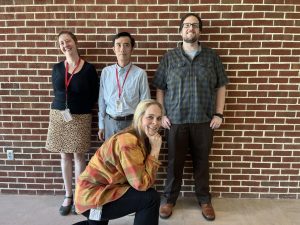Tolerance offers hope for a divided world
February 10, 2017
The past five years have seemed riddled with disaster: civil war and violence in the Middle East has generated a worldwide refugee crisis; disease emergencies have wreaked havoc in areas of the world that were already suffering; mass shootings and terrorism have plagued the world.
Instead of coming together to find solutions to the growing list of problems, we’ve let ourselves become divided. Instead of civilly sharing opinions and beliefs, we talk loudly over the person next to us, vying for more support, as if doing that will prove us right. We shut down anyone with different perspectives or ideas — if we even choose to listen or associate ourselves with them in the first place. In the midst of this war of words, its no wonder we’ve failed to resolve issues. However, there is a way to improve the world around us.
From Jan. 6-8, I attended the Civitan Leaders in Freedom Conference where I participated in seminars on leadership, economics, religious freedom, and politics. I met people with nationalities, backgrounds, beliefs, and concerns that were different from my own. While I was there, I gained a deeper understanding and new perspectives on world issues and on my role in finding solutions to those problems. The most important lesson I learned, though, was the importance of being open to new ideas and tolerant of different beliefs and opinions.
At the conference, Derius Swinton of the Soar Group, a leadership development and training company, led a discussion on the traits that effective leaders should and shouldn’t have; one of the most important traits we discussed was open-mindedness. Being open-minded doesn’t mean that you abandon your beliefs and opinions and adopt those of others, and it doesn’t mean that your views are unimportant. Being open-minded only requires that one listens to and considers different ideas. Learning about another person’s experiences or hearing new ideas allows solutions to problems to be found. It also helps us become more empathetic toward others and appreciative of our differences. Oftentimes, listening to different opinion allows a person to better support her own, through understanding others’ concerns and finding ways to address them. Instead of assuming someone’s character based on which presidential candidate he supported, or his position on abortion, ask him why he feels the way he does, with sincere intent to learn. Chances are, you’ll learn something new that will deepen your understanding of the topic and the person.
Along with open-mindedness comes tolerance—the willingness to accept and honor opinions and beliefs that differ from one’s own. Tina Ramirez, founder and president of Hardwired, an organization that advocates religious freedom worldwide, spoke at the conference, detailing ISIS’s genocidal attacks on the Yazidi in Iraq, and the experiences of thousands of girls who were abducted and sexually exploited. More than 5,000 Yazidis have been massacred since 2014 because of their religion. This seminar made me realize that, if tolerance had been practiced, those lives could have been saved, and thousands of girls could have been protected from unspeakable horror. Tolerance could have saved more than six million Jews in Europe, one million Armenians in the Ottoman Empire, one million Tutsis in Rwanda, and millions of others who were murdered simply because of their religion or ethnicity.
Everyone, regardless of religion, gender, sexual orientation, race, or background, deserves to be respected, and everyone has the responsibility to offer that respect to others. We don’t have to agree with someone’s beliefs, lifestyle, or choices, and we shouldn’t expect people to agree with ours. But tolerance isn’t about agreement; it’s about mutual respect and the recognition that we can’t force someone to think a certain way. It’s about the realization that everybody has the right to make his or her own decisions. Tolerance is a two-way street; if we refuse to respect different perspectives, how can we expect others to respect ours?
In a few years, this generation will be leading the world and solving its problems. We can choose to continue the current trends of closed-mindedness and intolerance that propel crises and create more obstacles, or we can choose to change our approach and work together to effect change. We need to be willing to listen to and consider new ideas and respect people for who they are. By doing so, we’ll be better able to compromise and make decisions that will benefit everyone, not just a select few. When we change our attitude, we’ll change the world.






